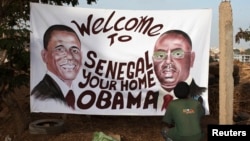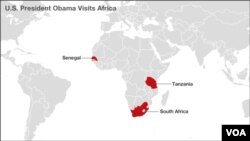DAKAR —
U.S. President Barack Obama and his family arrive in the Senegalese capital of Dakar late Wednesday to kick off a week-long, three-country Africa tour aimed at reinforcing democratic institutions and spurring American investment on the continent. The first family is traveling with a large delegation of American economic officials, business executives and journalists.
Obama starts his visit Thursday with bilateral talks with Senegalese President Macky Sall at the presidential palace in downtown Dakar.
The presidents are expected to discuss trade issues and security concerns in Africa's Sahel region, which has seen a spike in militant Islamist activity.
Obama's choice to visit Senegal, a small, French-speaking West African country, is seen as a nod to Senegal's democratic track record and its recent efforts to crack down on corruption.
Senegal's presidential spokesman, Abou Abel Thiam said Senegal is hoping for more than just a pat on the back.
He said what they want to see is Obama launch more economic initiatives for Africa that will help the continent take off and realize its vast potential. He said Obama is an American president, not an African one, but Africans still have a certain attachment to him. The Africa of today, he said, is a potential partner for the world. He said Obama is in his second mandate now and perhaps has a bit more freedom to do more for Africa.
Presidents Obama and Sall will hold a press conference before Obama heads to Senegal's Supreme Court to meet with regional justice officials.
Analysts say Dakar is a fitting place for this meeting. Senegal opened a special African tribunal this year to try ex-Chadian president Hissene Habre for crimes against humanity. It will be a first - an African court judging an African leader on African soil.
President Obama and his family spend Thursday afternoon at Goree Island, which was a final transit point in the Atlantic slave trade.
The island has become an important pilgrimage site for world leaders and African-Americans.
The first family will visit a small fort on the island called the Slave House [Maison des Esclaves]. Visitors can enter the cramped, poorly-ventilated cells where slaves were held while being fattened up to survive their grueling Transatlantic journeys. They can also stand in the infamous "Door of No Return" from which one can practically tumble into the blue waters of the ocean.
The president's visit to the island will be largely private, due to what one Senegalese official called "the emotional nature of the experience."
President Obama attends a state dinner Thursday night and then wraps up his visit to Senegal on Friday morning with a meeting on food security before heading to South Africa and then Tanzania for the remaining two legs of his trip.
Obama starts his visit Thursday with bilateral talks with Senegalese President Macky Sall at the presidential palace in downtown Dakar.
The presidents are expected to discuss trade issues and security concerns in Africa's Sahel region, which has seen a spike in militant Islamist activity.
Obama's choice to visit Senegal, a small, French-speaking West African country, is seen as a nod to Senegal's democratic track record and its recent efforts to crack down on corruption.
Senegal's presidential spokesman, Abou Abel Thiam said Senegal is hoping for more than just a pat on the back.
He said what they want to see is Obama launch more economic initiatives for Africa that will help the continent take off and realize its vast potential. He said Obama is an American president, not an African one, but Africans still have a certain attachment to him. The Africa of today, he said, is a potential partner for the world. He said Obama is in his second mandate now and perhaps has a bit more freedom to do more for Africa.
Presidents Obama and Sall will hold a press conference before Obama heads to Senegal's Supreme Court to meet with regional justice officials.
Analysts say Dakar is a fitting place for this meeting. Senegal opened a special African tribunal this year to try ex-Chadian president Hissene Habre for crimes against humanity. It will be a first - an African court judging an African leader on African soil.
President Obama and his family spend Thursday afternoon at Goree Island, which was a final transit point in the Atlantic slave trade.
The island has become an important pilgrimage site for world leaders and African-Americans.
The first family will visit a small fort on the island called the Slave House [Maison des Esclaves]. Visitors can enter the cramped, poorly-ventilated cells where slaves were held while being fattened up to survive their grueling Transatlantic journeys. They can also stand in the infamous "Door of No Return" from which one can practically tumble into the blue waters of the ocean.
The president's visit to the island will be largely private, due to what one Senegalese official called "the emotional nature of the experience."
President Obama attends a state dinner Thursday night and then wraps up his visit to Senegal on Friday morning with a meeting on food security before heading to South Africa and then Tanzania for the remaining two legs of his trip.





